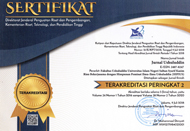BANJARESE ISLAMIC SCHOLARS (‘ULEMA) AND SOCIAL TRANSFORMATION IN TEMBILAHAN (PRELIMINARY RESEARCH)
Abstract
and its surroundings in the 19th century following the defeat of the Banjar Sultanate by
the Dutch colonialists. The religious intellectualism rooted in the Banjarese tradition has until
now resulted in the production of ‘ulema (religious scholars) even in new places to which they
have migrated. Using in-depth interviews with several figures in Tembilahan, this preliminary
study sheds light on how Banjarese ‘ulema in the area have contributed to the transformation
of society. This study is important as there has not been solid research-based information
about this important topic publicly available. It found that Banjarese ‘ulema have played an
important role in educating people through formal and informal ways to be religiously committed
and socio-economically active. They have demonstrated dynamic relations with society, but
some of them were not immune from political and material temptations. It seems that the farther
they stay away from such temptations, the more charisma they develop, and the more the opportunities they may have to contribute to the social transformation of Tembilahan society
Keywords
Full Text:
PDFReferences
Alatas, Syed Hussain. Intellectuals in Developing Societies. London: Frank Cass, 1977.
Ansyarullah, Andin. Bunga Rampai Sejarah Jaringan Intelektual Diaspora Banjar. http://www.kompasiana.com/alfigenk/bunga-rampai-sejarah-jaringan-intelektual-diaspora-banjar_56233ca7eaafbde11315a27c. Internet: diakses pada 20 Juli 2017.
Bourdieu, Pierre & Passeron, Jean-Claude. Reproduction in Education, Society and Culture. 2nd ed. London: Sage, 1990.
Creswell, John W. Research Design: Qualitative, Quantitative, and Mixed Methods Approaches. Los Angeles: SAGE Publications. 2009.
Daud, Alfani. Islam dan Masyarakat Banjar: Diskripsi dan Analisa Kebudayaan Banjar. Jakarta: PT Raja Grafindo Persada, 1997.
Desjardins, Richard. “Education and Social Transformation.” European Journal of Educatio 50, no. 3 (2015): 239-244. Doi: 10.1111/ejed.12140.
Gramsci, Antonio. Prison Notebooks -- the Intellectuals: the Formation of the Intellectuals. In Roger S Gottlieb (Ed.), An Anthology of Western Marxism (pp. 113-120). New York: Oxford University Press, 1989.
Hamid, Abdul. Pemikiran Syekh Abdurrahman Siddiq al-Banjari tentang Pendidikan Akhlak dan Tasawwuf. Bengkulu: LP2 STAIN Curup, 2013.
Hawkins, Mary. “Becoming Banjar.” Asia Pacific Journal of Anthropology 1, no, 1 (2000): 24-36. Doi: 10.1080/14442210010001705830.
Hilmy, Masdar. “Agama dan Politik.” Kompas (16 July 2014).
Horikoshi, Hiroko. A Traditional Leader in A Time of Change: The Kijaji and Ulamain West Java (Ph.D Unpublished). The University of Illinois, Urbana-Champaign, 1976.
Lincoln, Yvonna S. and Guba, Egon G. Naturalistic Inquiry. Newbury Park: Sage Publications. 1985.
Miles, Matthew B. and Huberman, A. Michael. Qualitative Data Analysis. Thousands Oaks: SAGE Publications. 1994.
Muthalib, Abdul. Tuan Guru Sapat: Kiprah dan Perannya dalam Pendidikan Islam di Indragiri Hilir Pada Abad ke 20. Yogyakarta: EJA Publisher, 2014.
Said, Edward. Representations of the Intellectuals. London: Vintage, 1994.
Taib, Mohammad Imron Mohammad. Who is an Intellectual. 2017. http://www.thereadinggroup.sg/Articles/Who%20is%20an%20Intellectual.pdf.
Turmudi, Endang. “Religion and Politics: A Study on Political Attitudes of Devout Muslims and the Role of the Kyai in Contemporary Java.” Southeast Asian Journal of Social Science 23, no. 2 (1995): 18-41.
Wikipedia. Charisma. https://en.wikipedia.org/wiki/Charisma. Internet: diakses pada 16 Juli 2017.
DOI: http://dx.doi.org/10.24014/jush.v26i2.5130
Refbacks
- There are currently no refbacks.
 Jurnal Ushuluddin Indexed By:
Jurnal Ushuluddin Indexed By:
Alamat Redaksi:
 Fakultas Ushuluddin UIN SUSKA Riau Jl. H.R. Soebrantas KM. 15,5 Panam – Pekanbaru
Fakultas Ushuluddin UIN SUSKA Riau Jl. H.R. Soebrantas KM. 15,5 Panam – Pekanbaru
 E-mail: jurnal.ushuluddin@uin-suska.ac.id
E-mail: jurnal.ushuluddin@uin-suska.ac.id
ejournal: http://ejournal.uin-suska.ac.id/index.php/ushuludin

Jurnal Ushuluddin is licensed under a Lisensi Creative Commons Atribusi 4.0 Internasional.

















